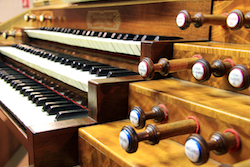Church Organs
Organ music is deeply embedded in Catholic liturgical tradition. Despite shifting preferences in church music, the pipe organ retains its position of high esteem. One of the documents from the Second Vatican Council said, “It is the traditional musical instrument that adds a wonderful splendor to the Church’s ceremonies and powerfully lifts up the spirit to God and to higher things.”
For many parishes, the organ is also the second most valuable physical asset, after the church building itself. Pastors and administrators must give serious consideration to the installation and maintenance of these exquisite instruments.

But don’t worry! You are not expected to be an expert and there is an abundance of help available. This article describes some of the things you should know and where you might turn for expert input.
Organs are not created equal. Pipe organs are generally preferred over electronic organs because they can provide a superior musical experience for both the congregation and the organist. Some experts describe the pipe organ as a living, breathing instrument. For many parishes, a pipe organ is a better financial and artistic investment than an electronic organ. Nonetheless, and generally for immediate financial considerations, some parishes opt for electronic organs. And some install electronic organs with a façade of non-functioning pipes!
If you have a pipe organ
Know what you have. You could have the Maserati or the Kia of organs and it may be hard to tell the difference if you are not a trained musician. Check the parish records for purchase and maintenance information.
To make sure you take proper care of whatever you have, you should have the organ tuned and maintained by a professional. Remember, this is a big, long term investment. You are the caretaker of an instrument that will likely outlast your tenure at the parish.
To find a reputable tuner or technician, check with local parishes, the archdiocesan Office of Liturgy or one of these two professional organizations: the Associated Pipe Organ Builders of America or the American Institute of Organ Builders.
A professional organ builder or technician can help you assess the condition of the instrument. Most people see only the keyboard, pipes and decorative housing of an organ, but there are many unseen elements involved in the production of its characteristic sounds.
Organs have metal, leather and wooden parts that are susceptible to environmental stresses including temperature, heat and humidity. Because the organ is a wind instrument, dust, plaster and paint chips can get sucked into the mechanism. Most organs use electricity to help pump air into the pipes, and old, dry wiring can be a fire hazard.
Maintenance
Organs should be tuned twice each year, once after the church’s heat is turned on in the fall and again after it is turned off in the spring. (It may be easier to remember pre-Christmas and Pre-Easter!) The tuning process frequently entails minor adjustments to controls known as “stops” that may be sensitive to temperature fluctuations. It is necessary to have two organ technicians to tune an organ properly. Travel time to and from each call is typically part of the cost.
Technicians can help identify issues that may need to be addressed in the future, in much the same way that an automobile technician can give you advance notice that your brakes will need to be relined. They can also help to develop a maintenance plan, wherein certain parts are replaced as they wear out and others are repaired. During the life of the organ, there will be major maintenance work required. Maintenance firms will work with the parish to develop a multi-phase plan that will fit the parish budget and keep the organ in good working order.
If you plan to repaint the church interior or do other major work in the building, make sure you arrange for the organ technician or other professional to wrap the organ components securely to keep them from being compromised.
Pipes should be cleaned every fifty years, but some organs built in the 1960s and 1970s were made with soft metal that eventually causes longer pipes to lean or fall over. The organ technician can advise on the best remedy.
Bottom line on maintenance and repair: Identify a competent organ builder or technician and rely on his or her professional advice.
Repairs
Repairs come in many forms, including restoration, renovation and rebuilding. In general, an organ is considered worth repairing when the cost of repair does not exceed 50% of the replacing with a new organ of the same sound quality, and when the repairs will keep the organ in good playing condition for a reasonable length of time.
The decision about what level of repair is warranted involves many variables and requires careful study and professional assessment. Regrettably, fine instruments have been discarded or ruined because of inaccurate information about the state of disrepair –or because the parish chose an unsuitable technician.

